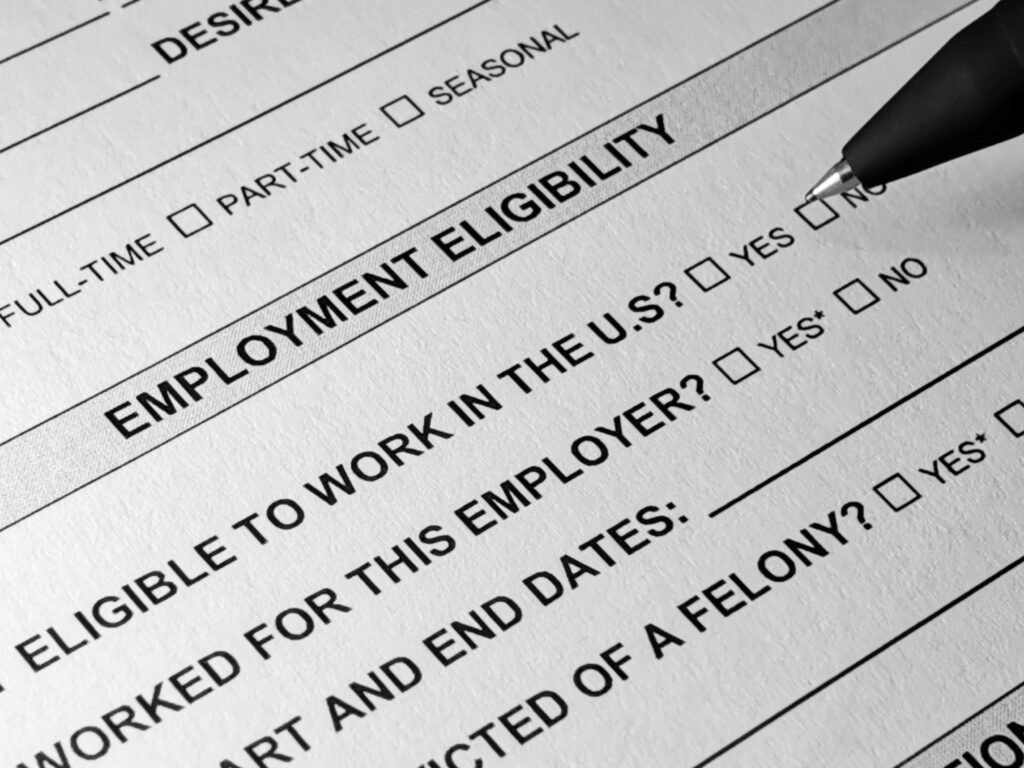News
Florida Enacts E-Verify Requirements for Employers
 The Spring 2023 legislative session in Tallahassee seems to have brought forth a flurry of new laws that have garnered the attention of state and national media. One important new law that may have flown under the radar, however, is SB 1718.
The Spring 2023 legislative session in Tallahassee seems to have brought forth a flurry of new laws that have garnered the attention of state and national media. One important new law that may have flown under the radar, however, is SB 1718.
Governor Ron DeSantis signed SB 1718 into law on May 10, 2023, which has now been codified, in part, as Florida Statute § 448.095 (the “Statute”). Effective July 1, 2023, all employers with 25 or more employees must use the E-Verify system to verify a new employee’s employment eligibility. Exceptions to the required use of the E-Verify system exist for independent contractors, as defined by federal law, and casual laborers performing services entirely in a private residence, but employers should carefully review these classifications to ensure that the applicable exemptions are met.
The Statute requires that that this verification occur no later than three (3) business days after the first day that the new employee begins work for pay. Employers are required to retain documentation and official verifications generated for at least (3) years. Covered employers are also required to certify compliance with the Statute on the employer’s first filed return when making contributions to or reimbursing Florida’s reemployment assistance system.
The Statute requires the Department of Economic Opportunity (“DEO”) to notify an employer prior to issuing penalties for a violation and gives the employer 30 days to cure noncompliance after receiving notice. Penalties for noncompliance go into effect July 1, 2024. A $1,000 per day fine until proof of curing the non-compliance is provided to DEO can be imposed if DEO determines that an employer failed to use the E-Verify system as required by the Statute three (3) times within a 24 -month period.
The Statute does not alter an employer’s obligations to comply with the federal requirements of the Immigration Reform and Control Act of 1986 and to have a timely completed I-9 form for each new employee.
Another recent announcement that has had little fanfare, is the Equal Employment Opportunity Commission’s (“EEOC”) May 15, 2023 update to its What You Should Know About COVID-19 and the ADA, the Rehabilitation Act, and Other EEO Laws. With President Biden declaring that the COVID-19 Public Health Emergency has ended, the EEOC revised its guidance to reflect when an employer may screen for COVID-19, such as taking an employee’s temperature. It also reminds employers that the end of the public health emergency “does not automatically provide grounds to terminate reasonable accommodations that continue to be needed to address on-going pandemic-related circumstances,” such as for employees at high-risk. The update also provides guidance on potential reasonable accommodations for employees with Long COVID.
Finally, in our March 2023 Disclosure article, we mentioned that the Federal Trade Commission (“FTC”) proposed a rule to ban non-competition clauses. The public comment period closed on April 19, 2023. The FTC, however, has not indicated when or if it will publish the final rule. We will keep you updated as soon as the FTC releases additional information on the anticipated Final Rule. For employers with employees in states outside of Florida, it is important to remember that several states, such as California, Colorado, Idaho, Illinois, Maine, Maryland, Nevada, North Carolina and Washington, may already have laws or regulations restricting the use of non-competition agreements.
As always, we appreciate your continued trust in our ability to shield you from liability and defend you when threatened.
Joan M. Vecchioli is a partner in the Clearwater office and is Board Certified in Labor and Employment Law by the Florida Bar.
Colleen M. Flynn is a partner in the Clearwater office whose practice focuses on Labor and Employment Law.
Rachael L. Wood is an associate in the Clearwater office whose practice focuses on Labor and Employment Law.
THIS ARTICLE IS PROVIDED FOR INFORMATIONAL PURPOSES ONLY AND SHOULD NOT BE CONSIDERED LEGAL ADVICE. LEGAL ADVICE CANNOT BE GIVEN WITHOUT INFORMATION ABOUT YOUR SPECIFIC SITUATION.

